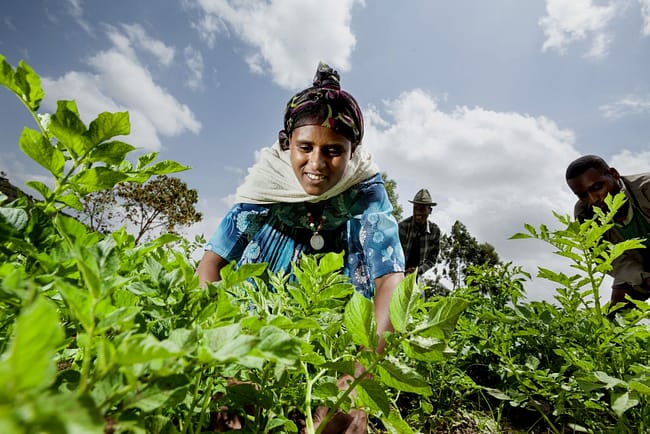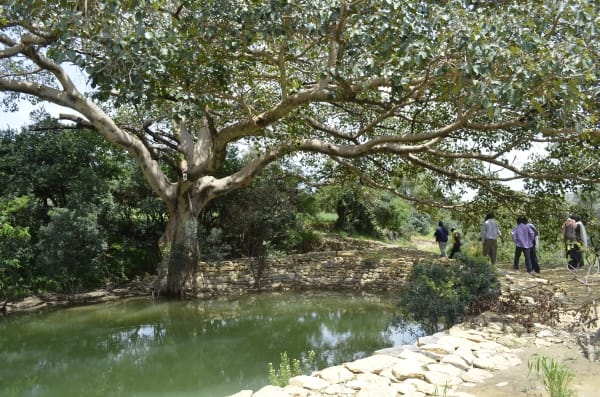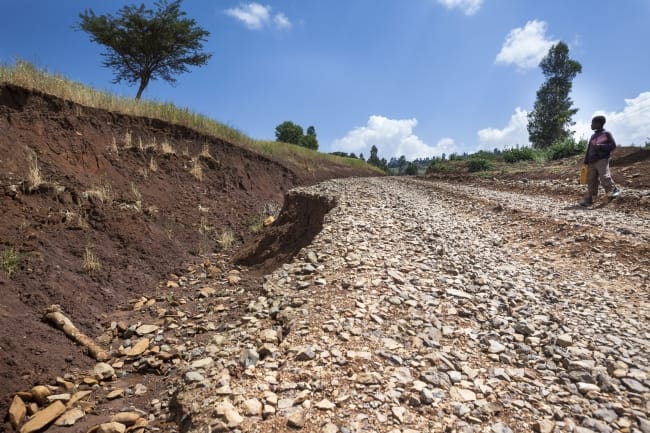Ambitious strategy aims to improve the lives of millions
Research conducted by the International Water Management Institute (IWMI) has been highlighted as influential in an ambitious initiative of the Ethiopian government to boost food production and the incomes of five million farmers.

Realizing the potential of household irrigation in Ethiopia, a working strategy document from the Ministry of Agriculture and Ethiopian Agricultural Transformation Agency, outlines specific plans for agricultural development to complement the government’s vision of achieving middle-income status by 2025.
Agriculture in Ethiopia accounts for half of the country’s gross domestic product (GDP) and 85% of employment. However, around 95% of smallholder farms rely solely on rainfall. According to the report, household irrigation involving simple water-lifting and water-saving technologies, together with the cultivation of high-value horticultural crops, could more than double farmers’ incomes where implementation is possible.
The strategy proposes “27 independent systemic interventions to increase the adoption and effectiveness of household irrigation technologies and build a vibrant and self-sustaining household irrigation sector.”
These measures take into account every step of the value chain, including research and policy development, technology access and adoption, input production and distribution for the cultivation of high-value crops, on-farm production, post-harvest handling, and market links.
Furthermore, they will “take into account the continuing challenges of gender sensitivity, water resource management and sustainable impact.”
In his foreword, Sileshi Getahun, State Minister, Ministry of Agriculture, writes: “IWMI has made significant contributions to research on irrigation in Ethiopia, with work on water management, agronomy, technology, scheme performance, and even market conditions for irrigated crops. Indeed, various studies made by IWMI were used as baselines during the development of this sector strategy.”
As well as contributing to the strategy’s review process, the report cites IWMI’s research in a number of areas. These include:
[fancy-ul style=”arrow-type3-list” variation=”blue”]- assessment of the current irrigated area in Ethiopia, and performance of irrigation schemes in those areas (page 16);
- groundwater mapping in Ethiopia (page 19);
- reasons for lower engagement and productivity of female famers (pages 22 and 23);
- issues of soil salinity as a result of inappropriate management of groundwater resources (page 27); and
- the efficacy of different kinds of pumps (page 39).
Simon Langan, Principal Researcher – Agricultural Water Management, and Head of IWMI’s East Africa and Nile Basin Office, Addis Ababa, Ethiopia, said:
“We are delighted to have been able to contribute to what is a robust and ambitious strategy for the development of irrigated agriculture in Ethiopia, a country where IWMI has been active for many years. The potential for improving agricultural practices and livelihoods outlined here is enormous.”
“This is part of our ongoing engagement with the Ministry of Agriculture and a number of other ministries, donors and nongovernmental organizations to provide the scientific basis for establishing best practices and new policies for improved water and natural resource management.
“We now look forward to supporting their efforts in putting this new strategy into practice.”
The research referred to in the Working Strategy Document is part of the CGIAR Research Program on Water, Land and Ecosystems (WLE).
Download a PDF of this IWMI Success Story here.
Download the PDF of the report here.




